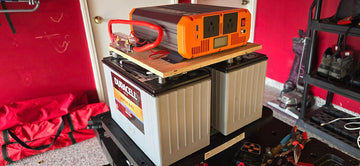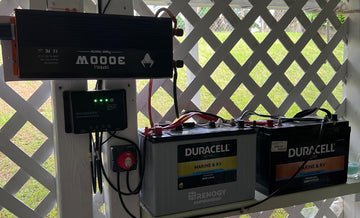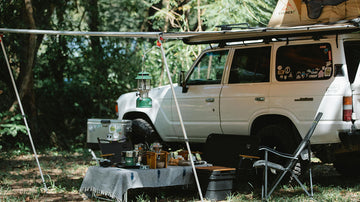For RV travelers, RV batteries are an important part of ensuring comfort and convenience. Whether you're camping in the wilderness or staying in the park, the performance of your battery has a direct impact on your traveling experience. In this article, we'll take an in-depth look at the lifespan of RV batteries, the factors that affect them, and how to extend their use to help you better manage your RV's power needs.
Table of contents:
Understanding RV batteries: types, features, performance indicators
An RV battery is a rechargeable energy storage device used to provide electrical support for an RV. It is capable of meeting the various electrical needs of an RV while traveling, such as starting the engine, lighting, heating and cooling systems, TVs and other electrical devices.
RV Battery Types
RV batteries are mainly categorized into the following types:
- Wet Lead Acid Battery: This is the most common type of battery and has the advantages of lower cost and mature technology. However, its maintenance cost is relatively high and requires regular checking of the electrolyte level and replenishment.
- Gel batteries: Gel batteries use a special gel electrolyte, which provides better shock and corrosion resistance than wet lead-acid batteries. In addition, gel batteries have a lower self-discharge rate, making them suitable for long term storage.
- AGM (Absorbed Glass Fiber Separator) Battery: AGM battery adopts glass fiber separator to absorb the electrolyte, which eliminates the need for regular maintenance of the electrolyte level. It has stable performance, strong shock resistance and high energy density.
- Lithium batteries : Lithium batteries are ideal for RV travel with their high energy density, long life and low maintenance costs. However, they are relatively costly and require special charging and management systems.
RV Battery Main Function
The primary function of an RV battery is to provide electrical support for the RV, which includes the following:
- Starting the engine: The battery provides the power needed to start the engine during the RV starting process.
- Power supply system: the battery provides power for lighting, heating and cooling systems, TVs and other electrical equipment in the RV.
- Emergency Backup: In an emergency, the battery can be used as an emergency backup power source to provide electrical support for critical equipment inside the RV.
RV Battery Performance Metrics
When evaluating RV battery performance, focus on the following indicators:
- Capacity (Ah, ampere-hour): Capacity determines how much power the battery can store. Generally speaking, the higher the capacity, the better the battery's range.
- Voltage (V, Volts): Voltage determines the compatibility of the device.RV batteries are usually rated at 12V or 24V.
- Cold Cranking Current (CCA, Cold Cranking Current Value): Cold Cranking Current reflects the battery's ability to start an engine at low temperatures. the higher the CCA value, the better the battery's starting performance at low temperatures.
- Internal Resistance (IR): IR reflects the internal conductivity of the battery. The lower the internal resistance, the better the discharge performance of the battery.
- Cycle life: Cycle life refers to how many complete charge/discharge cycles a battery can complete under specific conditions. The longer the cycle life, the longer the service life of the battery.
How Long Do RV Batteries Generally Last
The lifespan of RV batteries varies depending on a number of factors, but in general, wet lead-acid batteries last between 2 and 5 years, gel and AGM batteries can last between 5 and 8 years, and lithium batteries may last up to 10 years or more.
RV Battery Type Life and Cost Comparison Table:
| Battery Type | Useful life (years) | Charge time | Deep Discharge Impact | Maintenance Requirements | Cost |
| Wet lead-acid batteries | 2-5 | Longer | Longer | Higher | Low |
| Gel batteries | 5-8 | Medium | Smaller | Medium | Medium |
| AGM batteries | 5-8 | shorter | smaller | Low | Medium High |
| Lithium batteries | 10+ | Short | Very small | Low | High |
Factors that Market RV Battery Life
There are many factors that affect the life of an RV battery, here are some of the main ones:
1. Charging and discharging cycles
- Deep discharging: frequent complete discharging of a battery can cause damage to its internal structure and shorten its service life. Lead-acid batteries are particularly vulnerable to deep discharge.
- Charging frequency: Charging regularly and keeping the battery in the proper charge range can effectively extend its life.
2. Temperature
- High temperatures: Excessive temperatures accelerate the self-discharge and internal chemical reactions of the battery, which may lead to battery damage.
- Low Temperature: Extreme low temperatures can lead to reduced battery performance and capacity, placing an additional burden on the battery.
3. Usage load
- Current output: Frequent use of high power devices will increase the stress on the battery and shorten its life. Reasonable management of power demand is key.
4. Maintenance
- Cleaning: Regularly inspect and clean battery connectors and terminals to prevent oxidation or corrosion.
- Water level check (for lead-acid batteries): Maintain the proper level of battery electrolyte to avoid drying out.
5. Type and Quality
- Battery type: Different types of batteries (lead-acid, gel, lithium) have different life and performance characteristics. High-quality lithium batteries are usually more durable.
- Brand and manufacturing process: Choosing batteries with well-known brands and good manufacturing processes can improve reliability and longevity.
Ways to extend the life of your RV battery
There are many ways to extend the life of your RV battery, here are some effective tips and suggestions:
1. Choose the right type of battery
- Lithium batteries: Although the initial investment is higher, lithium batteries have a longer cycle life, faster charging speeds, and a stronger deep discharge capability, making them suitable for long-term use.
- Lead-acid batteries: If you choose lead-acid batteries, make sure you choose high-quality deep-cycle batteries for longer life.
2. Proper Charging
- Avoid deep discharge: Do not let the battery power drop to 0%. Try to keep the charge between 20% and 80%.
- Use a suitable charger: Make sure the charger matches the battery type to avoid overcharging or undercharging.
3. Regular Maintenance and Inspection
- Check battery water level: For lead-acid batteries, check the electrolyte level regularly and add distilled water as needed.
- Clean connectors: Clean battery connection ports and cables regularly to prevent corrosion and oxidation.
- Battery Condition Monitoring: Regularly check the voltage and health of the battery to detect potential problems in time.
4. Avoid extreme temperatures
- Maintain proper temperature: When using batteries in high and low temperature environments, pay attention to insulation and cooling, and try to avoid battery exposure to extreme weather.
- Temperature monitoring: Use temperature monitoring equipment so that timely adjustments can be made to the location and use of batteries.
5. Managing Electricity Use
- Rationalize the use of electrical appliances: Try to avoid using multiple energy-intensive devices at the same time to spread the burden of electricity consumption.
- Use energy-efficient devices: Choose efficient LED lights and energy-saving appliances to reduce the burden on batteries.
6. Reasonable storage
- Storage environment: When not in use, store the battery in a dry, cool place and avoid direct sunlight.
- Maintain proper state of charge: Before storing for a long period of time, make sure the battery is charged to the proper level to prevent damage due to over-discharge.
7. Avoid Vibration
- Installation: Make sure the battery is installed securely to avoid vibration while driving, which can prevent internal damage.
By following the above methods, you can significantly extend the life of your RV battery, ensuring reliable power support while traveling in your RV.
How to tell if the RV battery needs to be replaced
There are several methods and indicators that can be used to determine if an RV battery needs to be replaced:
1. Check the voltage
- Measure the voltage: Use a multimeter to measure the voltage of the battery. For lead-acid batteries, the voltage should be 12.6 volts or higher at full charge. Below 12.4 volts, the battery may need to be recharged, while below 12.0 volts usually indicates a faulty battery that needs to be considered for replacement.
2. Observe the appearance of the battery
- Corrosion and Damage: Check the battery connectors, terminals and case for visible corrosion, leakage or cracks. If you see these signs, it usually means the battery needs to be replaced.
- Bulging or distortion: Any bulging of the battery casing indicates that the internal chemistry is out of whack and the battery should be replaced immediately.
3. Evaluate charging and discharging capabilities
- Charging efficiency: If the battery is unable to reach normal voltage after charging, or if it cannot hold a charge, it may indicate that the battery is aging.
- Discharge test: Observe the battery's ability to supply power when using high energy consumption equipment. If the charge level decreases rapidly or does not support the expected usage time, replacement should be considered.
4. Check age of use
- Battery age: Most lead-acid batteries last 3 to 5 years, and lithium batteries can last much longer (usually 8+ years). If a battery has been used beyond its expected life, it may be a good time to replace it, even if there are no obvious problems.
5. Use battery monitoring equipment
- Battery monitoring system: Using a battery management system or monitor that tracks the status of the battery in real time, including charge level, health, and number of charge/discharge cycles, can identify potential problems earlier.
6. Watch for changes in performance
- Lack of power: If you feel a lack of power during normal use, especially if your device is not functioning properly, this may be a sign of declining battery performance.
- temp: Moderate temperature variations may cause a drop in battery performance and in extreme cases may be a sign of battery failure.
Best Lithium Battery Recommendations for RVs
To ensure that your motorhome (RV) is able to provide constant and stable power while you are on the road, it is crucial that you choose a suitable battery. Here are our picks for 2 lithium batteries that are perfect for RVs and are widely recognized for their impeccable quality, long-lasting service life, and excellent performance.
12V 100AH LiFePO4 Lithium Battery

This battery has a cycle life of thousands of cycles, high energy density, light weight and requires no frequent maintenance. Built-in BMS intelligent management system ensures the safe and stable operation of the battery, effectively preventing overcharge, overdischarge, overcurrent and other problems. Suitable for home energy storage, UPS backup, electric vehicles and other scenarios, it is your trustworthy energy partner. Whether for outdoor adventure or daily life, it can bring you lasting and stable power support.
Product features of this lithium battery:
Lithium-iron battery (LiFePO4) Features Simplified:
- Long life: 2000-5000 cycles, 810 times more than lead-acid batteries.
- High capacity: twice the capacity of lead-acid batteries.
- Light weight: high energy density and 30% weight reduction.
- No memory effect: good power retention when not in use, no loss of capacity due to discharged state.
- Built-in BMS: protects the battery from overcharge, overdischarge, overcurrent and short-circuit, low self-discharge rate, high temperature (50°C) charging protection.
- Safety: safer than lead-acid batteries.
- Expandable capacity: can be connected in parallel and series, up to 48V 400AH.
- Low Temperature Protection: Avoid 32℉/0℃ low temperature charging damage.
- Peak current: BMS peak current up to 300-350A for 3~5 seconds, suitable for ships.
12V 200Ah Lithium LiFePO4 Deep Cycle Battery

This 12.8V 200Ah LiFePO4 battery is a superior power solution designed for modern life and extreme environments, providing you with safe, efficient and environmentally friendly power support. Utilizing advanced LiFePO4 technology, this battery not only outperforms traditional lead-acid batteries in terms of performance, but also offers the benefits of long life and lightweight, making it suitable for a variety of application scenarios.
Product Main Features
- Superior performance: The battery is equipped with 8 A-grade brand new LiFePO4 cells and a built-in 100A BMS system with over-charging, over-discharging, over-current and short-circuit protection to ensure safe and stable operation.
- Long life and light weight: More than 4,000 cycles, which is more economical compared to traditional lead-acid batteries (only 200-500 cycles). The battery weighs only 48.6 pounds, about one-third the weight of a lead-acid battery, making it easy to handle and install.
- Eco-friendly design: As an acid-free battery, LiFePO4 batteries are safer and more environmentally friendly than lead-acid batteries, reducing the impact on the ecosystem.
- Low self-discharge rate: The battery maintains excellent storage performance, ensuring maintenance-free storage for up to one year, adding convenience to your life.
FAQs
What battery capacity do I need for my caravan?
The capacity of your battery depends on your electricity needs, and it is usually recommended to have a battery of at least 100Ah.
Are lithium batteries really worth the investment?
Although lithium batteries have a high initial cost, their longevity and performance make them an affordable long-term option.
How should I maintain my RV battery in cold weather?
In cold weather, try to keep your batteries insulated and charge them regularly. A battery heater can be used to prevent battery performance degradation due to the cold.
How do I store an RV battery that will not be used for an extended period of time?
Before storing for an extended period of time, make sure the battery is charged to the proper level (typically 50% to 75%) and then store in a dry, cool place. Regularly check the status of your batteries and recharge them as necessary.
Can I mix RV batteries with household batteries?
Mixing different types, brands or capacities of batteries is not recommended as it may cause the battery to fail or reduce overall performance.













